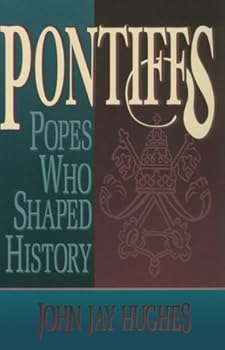Pontiffs: Popes Who Shaped History
No Synopsis Available.
Format:Paperback
Language:English
ISBN:0879734795
ISBN13:9780879734794
Release Date:January 1994
Publisher:Our Sunday Visitor
Length:320 Pages
Weight:1.15 lbs.
Dimensions:0.8" x 6.0" x 9.0"
Customer Reviews
1 rating
An Outstanding History!
Published by Thriftbooks.com User , 20 years ago
When I began reading "Pontiffs: Popes Who Shaped History" I was expecting a book which would be interesting and informative. It did not take me long to realize that I had seriously underestimated it. This book is outstanding! This book introduced me to Popes about whom I knew little or nothing and told me a lot about others with whom I had some familiarity. What I appreciate most about this book is its ability to place facts, of which I had previously heard, in their context or in a light of which I had never thought. Fr. Hughes features eleven Popes from St. Peter to Pope John XXIII. Not all of these seem to be among Fr. Hughes' favorites, nor did they always affect history in a positive manner, but each did leave their marks on the course of history. St. Peter preserved the Church in the early years after the Resurrection. St. Leo The Great (440-61) defended the Church and Rome from the onslaught of the Barbarians while guiding it through the collapse of the Empire in the West. St. Gregory The Great (590-604) sponsored missionary outreach and left a canon which helped define orthodoxy. Gregory VII (1073-85) tested his strength against that of Medieval Monarchs, before Innocent III (1198-1216) defended the Church from heresy, preached Crusades and approved the rise of the great Mendicant orders of the Church. Boniface VIII (1294-1303) also sparred with monarchs and revised canon law. The response of Leo X (1513-21) to the challenges of Martin Luther and others contributed to the split of Christendom. Pius V (1566-72) inspired the defense of Christendom form the Turks, while his response to Protestantism, particularly in the person of Elizabeth I of England, weakened Christian solidarity. Pius VII lead the Church through the Napoleonic era and related upheavals, giving the Church advances and setbacks, while altering the balance between national Churches and the Papacy. Leo XIII (1878-1903) turned the Church to face the "Social Question" while failing to understand the changing political forces of his day. John XIII intervened in great power crises and called Vatican II, which lead to so many reforms within the Church. If this book seems to lack a consistent theme, it is because history is inconsistent. Fr. Hughes does not choose a theme and then fit the characters into it. He tells the story of each of these historically significant Pontiffs. They were different men facing different challenges. They met success and failure in varying proportions. They sometimes advanced the Church and civilization, and at other times inflicted grievous and long standing wounds. They represent no consistent path of advancement. I learned the context of things that already knew. One professor had told me that, at the time of the Great Schism, Popes were called "Vicars of Peter" and suggested that readoption of that title might be a step toward reunification of the two great branches of Catholicism. Fr. Hughes explains the importance of th





